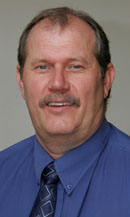 |
Prof. André Roodt, newly-elected ECA president.
30 August 2012 |
Prof. André Roodt, Chairperson of the Department of Chemistry, made history in being elected as the first non-European president of the European Crystallographic Association (ECA). He was elected as the new president of the ECA for 2012-2015 at the 27th European Crystallographic Meeting held in Bergen, Norway, recently.
Other members of the current Executive Committee are from the UK, Italy, Belgium, Germany, Spain, Russia, Hungary and the Czech Republic. The ECA’s national membership includes more than 40 countries in Europe, the Middle East and Africa, and covers research on all aspect of pure and applied crystallography, including intersections with biology, earth sciences, mathematics, physics, chemistry and materials science.
It is the first time since its inception more than 40 years ago the ECA has a non-European president, and in particular the first one from Africa.